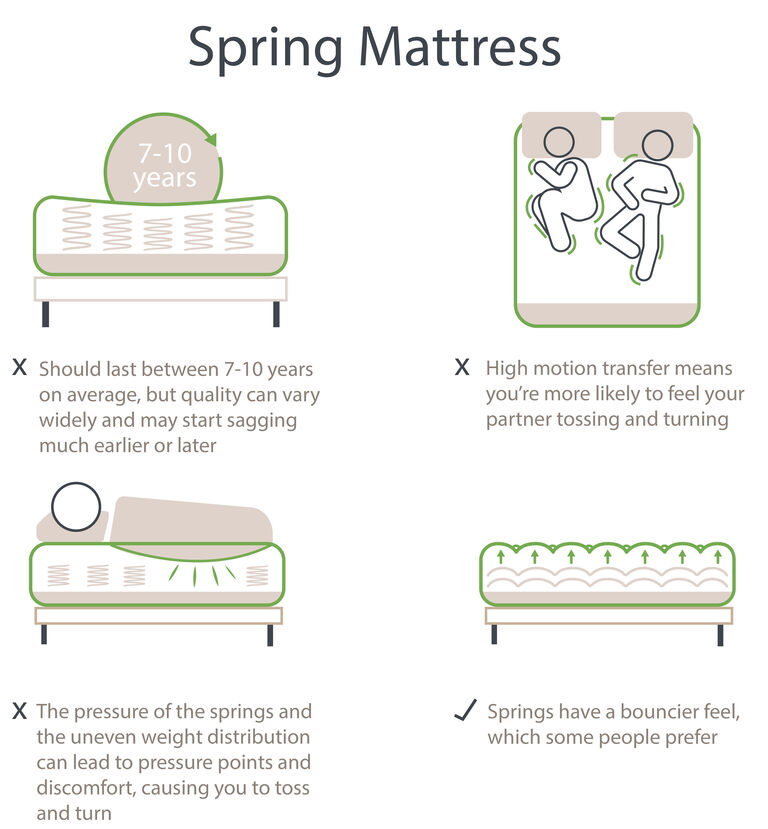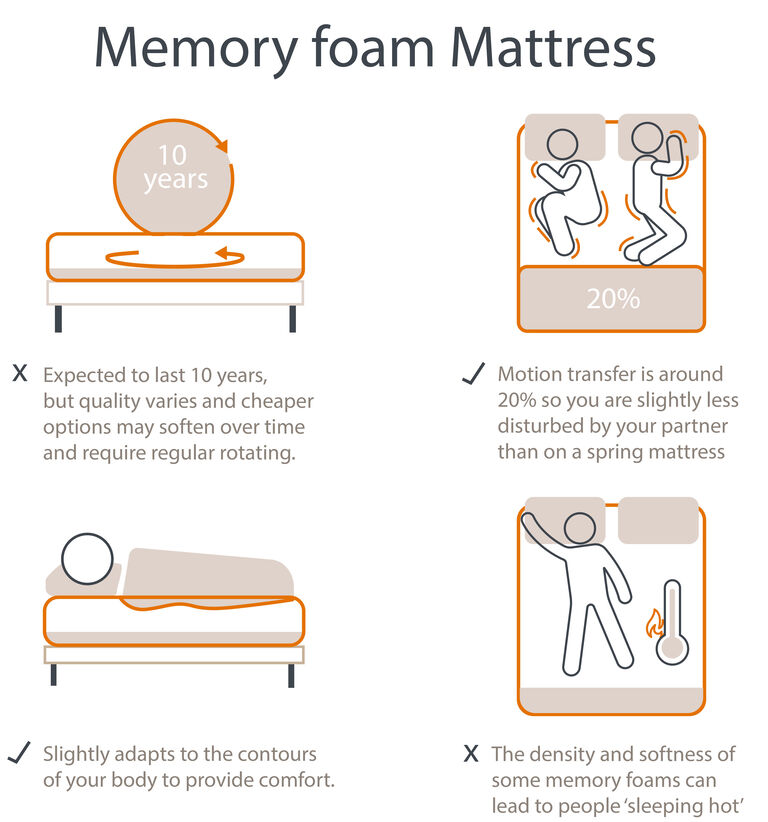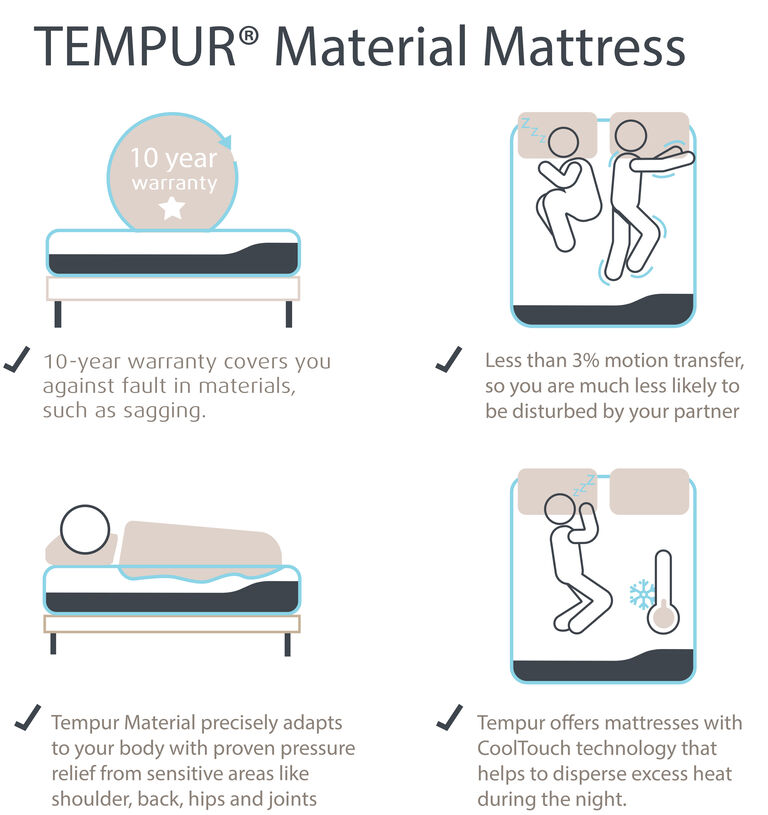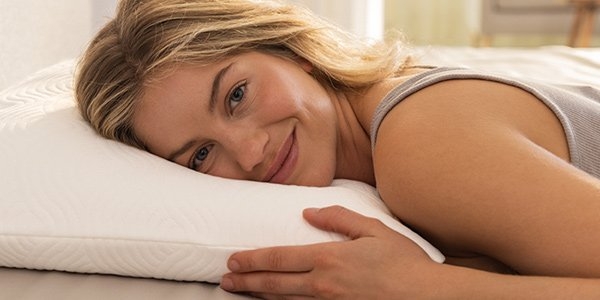What’s the difference between spring mattresses, memory foam and TEMPUR® Material?

Choosing a mattress is a big decision, and one of the first steps is to choose which type of mattress to go for. Let’s take a closer look at the differences between spring, ordinary memory foam and TEMPUR® Material to help you decide which is right for you.
First thing’s first – each mattress type in a nutshell:
What is a spring mattress?
Spring mattresses are one of the oldest types of mattress, dating back to the mid-1800s[i]. Today, there are various types of springs to choose from, with inner spring (a network of interconnected coils) and pocket spring (individual springs placed in little ‘pockets’) mattresses among the most popular. The springs make up the support layer and are then topped with a cushioning material (usually a type of foam) and wrapped in a cover. As the name suggests, spring mattresses can be pretty bouncy[ii].

What is a memory foam mattress?
Memory foam mattresses are made with viscoelastic foam, which has both viscous (fluid-like) and elastic (spring-like) properties. The material’s high viscosity means the mattress responds to the shape of your body when you lie down, providing support. It then returns to its original shape after you get up[iii] (hence the name ‘memory’ foam). Bear in mind that the quality of memory foam can vary widely with different levels of comfort, support and durability.

What is a TEMPUR® Material mattress?
TEMPUR® Material is a high-density viscoelastic material. The key with memory foam is to find the right balance between comfort and support for sleeping, and we believe we have achieved that. We created the world’s first memory foam mattress and pillow based on an original invention by NASA, and have spent many years refining and perfecting our design. Only TEMPUR® Material is able to respond to your body’s precise shape, weight AND warmth, aligning and adapting to every inch of you. That is the secret. That’s what offers the proven advanced pressure relief. That’s what creates an unrivalled level of comfort and support. Originally a great success in the healthcare sector, TEMPUR® is now found in bedrooms around the world, where it’s transformed the way millions of people sleep – for the better.

What is the most comfortable mattress to sleep on?
Spring mattress
When you lie on an average spring mattress, it responds to you by pushing back with a similar amount of pressure as your body applies to it. Some people like the bouncy feel this creates but, as our bodies don’t apply pressure evenly across the mattress, the areas that apply the most weight to the mattress will also get the most pushback. This can create pressure points, potentially causing you to experience discomfort. It can also lead to you tossing and turning throughout the night, which can cause you to twist your body into unnatural positions and leave you feeling sore in the morning.
Memory foam mattress
A memory foam mattress provides more even support than a spring mattress. Because it moulds to the shape of your body, distributing your weight evenly, you’ll experience fewer pressure points. However, the quality of different memory foams will vary. So too will the level of comfort and support you experience. Some memory foam offers plenty of comfort, but little support, while others do the opposite. While greater comfort may seem the more appealing option at first, the lack of support could prove to be problematic over time – while too much support could cause the mattress to feel overly firm.
TEMPUR® Material mattress
With its unique properties, TEMPUR® Material offers unrivalled comfort and support. Its unique feel helps to provide the comfort you need to drift off faster, while also reducing tossing. A number of clinical trials have also proven that some forms of TEMPUR® Material can relieve pressure from sensitive areas like the shoulders, back, hips and joints[iv], meaning you’ll feel relaxed all over. Some people describe lying on a TEMPUR® mattress as feeling weightless, others say it’s like sleeping on a cloud. We just say it’s a feeling like no other!
Will it make me overheat?
Spring mattress
Spring mattresses are generally seen as a cooler option than memory foam. They’re made up of multiple layers which are typically very breathable and allow good airflow to your body.
Memory foam mattress
Some people report sleeping hotter on ordinary memory foam and believe this is caused by the mattress itself warming up. It is possible that the density of a less expensive material may mean ventilation can be an issue.
TEMPUR® Material mattress
Yes, we all want a cozy night’s sleep but our body temperature adjusts when winding down and waking up. Switching to a lighter duvet or investing in some high-quality cotton sheets means you are in for a more breathable and cooler sleep.
If you prefer to be cool as a cucumber while you sleep, we offer TEMPUR® CoolTouch mattresses, which uses the latest fabric technology to provide a cool-to-the-touch sensation and are even more effective at dispersing excess heat during the night.
What’s it like sleeping next to a partner?
Spring mattress
Because of the bounciness of the average spring mattress, you’re likely to feel your partner tossing and turning, which can lead to disturbed sleep (and maybe an argument in the morning!).
Memory foam mattress
Memory foam typically reduces motion transfer, so you’re less likely to be disturbed by your partner’s movements. The higher a mattress’s motion transfer rate, the more disturbance you’ll feel at night. Ordinary memory foam can have a motion transfer can be up to 20%.
TEMPUR® Material mattress
TEMPUR® Material has been scientifically tested by our team in Denmark to have less than 2% motion transfer, so you are much less likely to be disturbed by your partner moving around at night. This means an incredible night’s sleep for you both – and less chance of an argument the next day!
Is it good for my pain?
Spring mattress
Although some spring mattresses can be comfortable without the pressure-relieving or motion isolating qualities of memory foam, they are not ideal for people living with pain. Spring mattresses provide less pressure relief for essential areas, such as your neck, shoulders and hips. This in turn can cause discomfort, leading to you tossing and turning more at night. This can even cause you to sleep in unnatural positions – thus worsening the discomfort. Also, the dips and valleys which may develop in spring mattresses over time will mean you’ll no longer be sleeping on an even surface, which can put extra pressure on certain body parts and cause even more discomfort.
Memory foam mattress
By adapting to the contours of your body, memory foam distributes your weight more evenly, so you’ll experience fewer pressure points. It can be great for those suffering from back or joint pain. However, if the material is too firm, it could put more pressure on painful areas at night, increasing any pain you’re experiencing[v]. On the other hand, if the material is too soft, it can feel comfortable at first, but the lack of support can prove problematic later.
TEMPUR® Material Mattress
Its super adaptive properties evenly comfort and support your entire body. By reducing pressure points, TEMPUR® also helps to reduce tossing and turning at night. This in turn can help to reduce the chances of you twisting your body into a position that can cause pain, stiffness and discomfort. All the while, you sleep deeper for longer, giving your body the best chance of repairing itself.
No wonder TEMPUR® is trusted by medical professionals worldwide. In fact, when TEMPUR® Material was first developed, it was used exclusively for healthcare and medical purposes, and some forms of TEMPUR® Material have proven their benefits in multiple clinical trials. Even today, our products are CE marked as medical devices by the European Union and our mattresses and pillows are still widely used in the healthcare sector.
How long will it last?
Spring mattress
A good spring mattress should last between seven and ten years[vi]. However, if you choose an average spring mattress you will notice over time how the springs become less uniformed and more prone to poking and sagging[vii], which can lead to discomfort. Another issue with spring mattresses is that over time the top cushioning breaks down or moves around, creating dips and valleys, making the mattress feel lumpy – not ideal for a good night’s sleep!
Memory foam mattress
Memory foam mattresses are generally considered to be more durable and long-lasting than spring options[viii] and are usually expected to last for up to ten years.
However, different types of memory foam will vary in quality and longevity. Higher quality memory foam mattresses, which typically have a higher density, are likely to be more durable[ix]. Cheaper options may soften over time and require regular rotating to see them through the last couple of years.
TEMPUR® Material mattress
At TEMPUR®, quality is at the heart of everything we do. During the 60 hours it takes to create one TEMPUR® mattress, our team performs up to 67 (yes 67!) different quality checks to ensure you receive the highest quality mattress possible. If any one of our specialists feels the mattress isn’t perfect quality, they will reject it, no questions asked. We don’t accept anything but the best, which is why we’re confident that your TEMPUR® Mattress will stand the test of time.
We’re sure your TEMPUR® mattress will last a minimum of 10 years. Our warranty covers you against sagging, warping, and loss of responsiveness.
Source References:
[i] https://sleepopolis.com/blog/foam-vs-spring-mattress/
[ii] https://sleepopolis.com/blog/foam-vs-spring-mattress/
[iii] https://www.thesleepjudge.com/what-is-memory-foam/
[iv] http://www.mizuhosi.com/wp-content/uploads/TEMPUR®-vs-Conv-Foam-Support-Surfaces-reprint.pdf
[v] https://sleepopolis.com/blog/foam-vs-spring-mattress/
[vi] https://www.thespruce.com/how-often-to-replace-mattresses-1391234
[vii] https://sleepopolis.com/blog/foam-vs-spring-mattress/
[viii] https://sleepopolis.com/blog/foam-vs-spring-mattress/
Check out some more posts


Feel it for yourself
Find a TEMPUR store or Stockist and try out our range of mattresses for yourself

SIGN UP FOR THE NEWSLETTERS!
By signing up, you agree to receive TEMPUR Singapore’s products, services, news, reviews and promotions by emails. For more information on how we process your personal data, please refer to our Privacy Policy.




